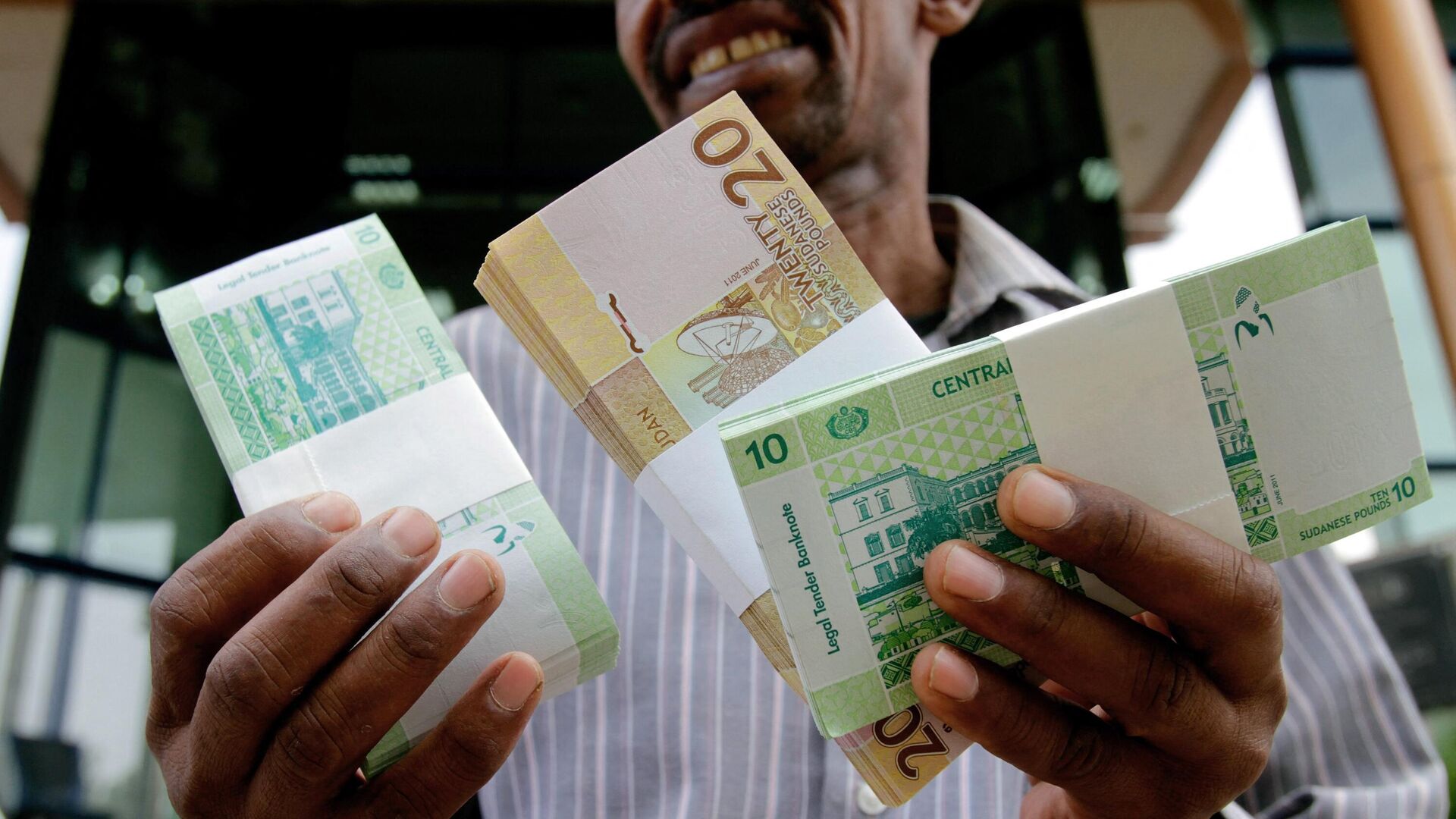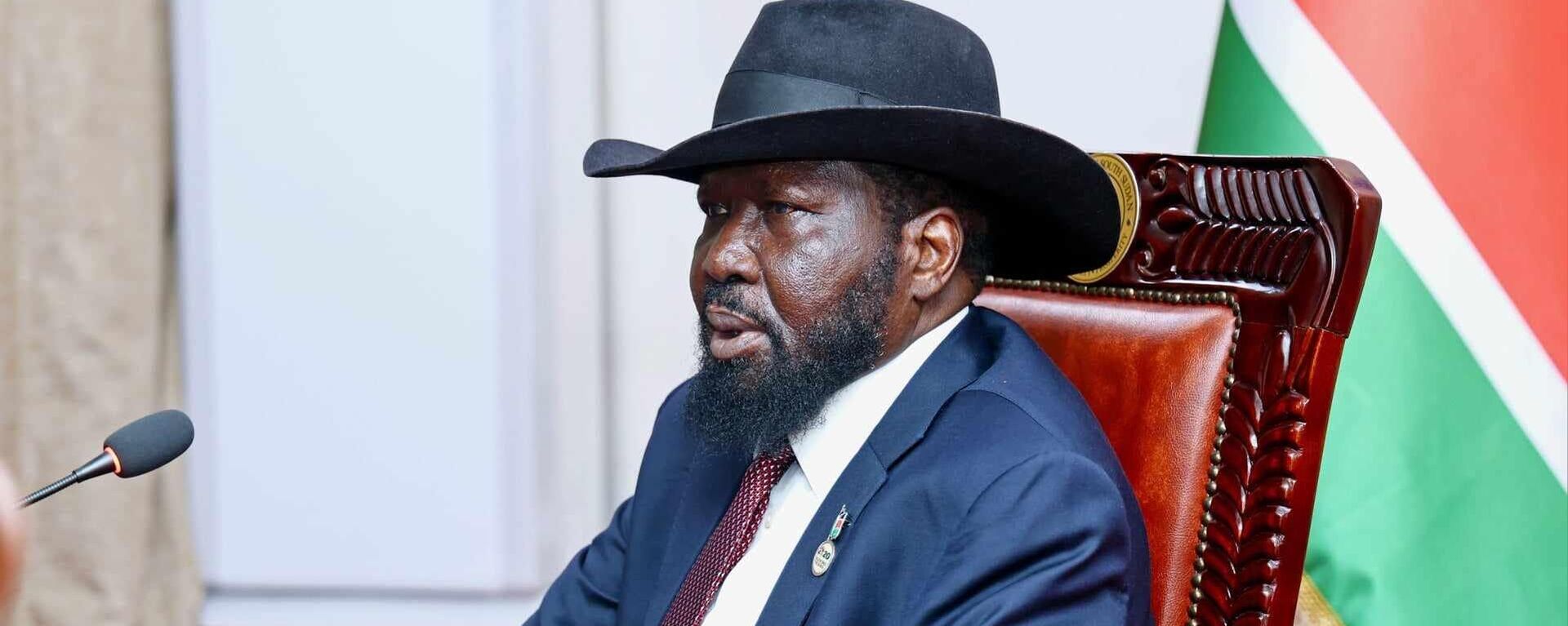https://en.sputniknews.africa/20240331/south-sudan-adopts-strict-measures-to-suppress-parallel-foreign-exchange-market-to-combat-inflation-1065850120.html
South Sudan Adopts Strict Measures to Suppress Parallel Foreign Exchange Market to Combat Inflation
South Sudan Adopts Strict Measures to Suppress Parallel Foreign Exchange Market to Combat Inflation
Sputnik Africa
In mid-March, South Sudan's President Salva Kiir fired the country's Minister of Finance and Economic Planning, Dr. Bak Barnaba Chol Bak, amid hyperinflation... 31.03.2024, Sputnik Africa
2024-03-31T12:04+0200
2024-03-31T12:04+0200
2024-03-31T12:43+0200
south sudan
sub-saharan africa
east africa
economy
salva kiir
sudan
united nations (un)
african development bank (afdb)
international monetary fund (imf)
currency
https://cdn1.img.sputniknews.africa/img/07e8/03/1f/1065850676_0:181:2995:1866_1920x0_80_0_0_e77674a35b03345662091dc75d9ce7a0.jpg
South Sudan has implemented strict measures against foreign exchange (FX) dealers in the capital city of Juba in an attempt to stabilize its fast-depreciating currency, as stated by the country's chief central banker, James Alic Garang.He stated that individuals with a dealer's license are not at risk.The official exchange rate of the SSP depreciated during the first quarter to approximately 1,600 to the US dollar, compared to 1,000. On the black market, it is being traded at a rate closer to 2,300 to the US dollar.Furthermore, Garang said that his recent journey to an undisclosed foreign destination was fruitful in securing more resources for the country. These resources will be allocated towards salaries and market stabilization, the media revealed.On Friday, the Bank of South Sudan issued a press release which stated that the bank "is closely monitoring developments in the foreign exchange market" and that it "has taken proactive measures and mobilized sufficient FX resources to intervene in the market with immediate effect."The bank also adopted some other measures to stabilize the FX market, namely:Lastly, the bank encouraged the public to use electronic payment solutions to reduce the substantial amount of cash held outside the banking system.The economic development of the world's youngest state (South Sudan became a political entity in 2011) has experienced its ups and downs.Outbreaks of civil war in 2013 and 2016 undermined its development, but the end of the conflicts, the formation of a transitional government, and a series of reforms contributed to recovery and peacebuilding.However, South Sudan's economic prospects were clouded by the COVID-19 pandemic. In addition, due to the conflict in neighboring Sudan, through which South Sudan exports oil, problems have arisen in this area, which provides the main influx of finance into the economy.Moreover, vulnerability to climate change and natural disasters is exacerbating the humanitarian crisis in the country. It was estimated by the UN that some 9.4 million people, or 76% of the population, would be in need of humanitarian assistance in 2023.Nevertheless, despite all the difficulties, over the past three years there has been a positive trend in the country’s economy, as can be seen from the outlook of the African Development Bank: GDP and the budget balance are growing, and inflation is falling.Moreover, in January, the International Monetary Fund predicted that by 2028, South Sudan will rank 10th in terms of GDP growth at 5.4% among other countries in the world.
https://en.sputniknews.africa/20240316/south-sudans-president-fires-finance-minister-amid-worsening-economic-situation-1065592558.html
south sudan
east africa
sudan
Sputnik Africa
feedback@sputniknews.com
+74956456601
MIA „Rossiya Segodnya“
2024
Christina Glazkova
https://cdn1.img.sputniknews.africa/img/07e7/0b/07/1063380906_0:0:673:674_100x100_80_0_0_79628b4d0cd9f29291a57aa13bbf9e7a.jpg
Christina Glazkova
https://cdn1.img.sputniknews.africa/img/07e7/0b/07/1063380906_0:0:673:674_100x100_80_0_0_79628b4d0cd9f29291a57aa13bbf9e7a.jpg
News
en_EN
Sputnik Africa
feedback@sputniknews.com
+74956456601
MIA „Rossiya Segodnya“
Sputnik Africa
feedback@sputniknews.com
+74956456601
MIA „Rossiya Segodnya“
Christina Glazkova
https://cdn1.img.sputniknews.africa/img/07e7/0b/07/1063380906_0:0:673:674_100x100_80_0_0_79628b4d0cd9f29291a57aa13bbf9e7a.jpg
south sudan, east africa, economy, salva kiir, sudan, united nations (un), african development bank (afdb), international monetary fund (imf), currency, crisis, finance, trade
south sudan, east africa, economy, salva kiir, sudan, united nations (un), african development bank (afdb), international monetary fund (imf), currency, crisis, finance, trade
South Sudan Adopts Strict Measures to Suppress Parallel Foreign Exchange Market to Combat Inflation
12:04 31.03.2024 (Updated: 12:43 31.03.2024) Christina Glazkova
Writer / Editor
In mid-March, South Sudan's President Salva Kiir fired the country's Minister of Finance and Economic Planning, Dr. Bak Barnaba Chol Bak, amid hyperinflation and depreciation of the local currency, South Sudanese Pound (SSP).
South Sudan has implemented strict measures against
foreign exchange (FX) dealers in the capital city of Juba in an attempt to stabilize its fast-depreciating currency, as stated by the country's chief central banker, James Alic Garang.
“You have seen the law enforcement agencies telling people who are carrying large quantities for no reason not to do so,” Garang said, as cited by the media. “Anybody selling dollars, either on the streets, or in their houses, or in their shops, or any corner anywhere, will be asked by the law enforcement; if you are selling, show me your license.”
He stated that individuals with a dealer's license are not at risk.
The official exchange rate of the SSP depreciated during the first quarter to approximately 1,600 to the US dollar, compared to 1,000. On the
black market, it is being traded at a rate closer to 2,300 to the US dollar.
Furthermore, Garang said that his recent journey to an undisclosed foreign destination was fruitful in securing more resources for the country. These resources will be allocated towards salaries and market stabilization, the media revealed.
On Friday, the Bank of South Sudan issued a
press release which stated that the bank "is closely monitoring developments in the foreign exchange market" and that it "has taken proactive measures and mobilized sufficient FX resources to intervene in the market with immediate effect."
The bank also adopted some other measures to stabilize the FX market, namely:
Intervene in the FX market with a monetary policy rate that strengthens the South Sudanese pound, using a weekly FX auction at a revised bank reference rate;
Take the appropriate steps to promote transparency, increase liquidity, maintain a fair and orderly market environment, and strengthen regulatory monitoring;
Collaborate with the Ministry of Finance and Planning and other government agencies to strengthen efforts to create a robust and competitive foreign exchange market for long-term economic growth and development.
Lastly, the bank encouraged the public to use electronic payment solutions to reduce the substantial amount of cash held outside the
banking system.
The economic development of the world's youngest state (South Sudan became a political entity in 2011) has experienced its ups and downs.
Outbreaks of civil
war in 2013 and 2016 undermined its development, but the end of the conflicts, the formation of a transitional government, and a series of reforms contributed to recovery and peacebuilding.
However, South Sudan's economic prospects were clouded by the COVID-19 pandemic. In addition, due to the conflict in neighboring
Sudan, through which South Sudan exports oil, problems have arisen in this area, which provides the main influx of
finance into the economy.
Moreover, vulnerability to climate change and natural disasters is exacerbating the humanitarian crisis in the country. It was estimated by the
UN that some 9.4 million people, or 76% of the population, would be in need of humanitarian assistance in 2023.
Nevertheless, despite all the difficulties, over the past three years there has been a positive trend in the country’s economy, as can be seen from the
outlook of the African Development Bank: GDP and the budget balance are growing, and inflation is falling.
Moreover, in January, the International Monetary Fund
predicted that by 2028, South Sudan will rank 10th in terms of GDP growth at 5.4% among other countries in the world.



